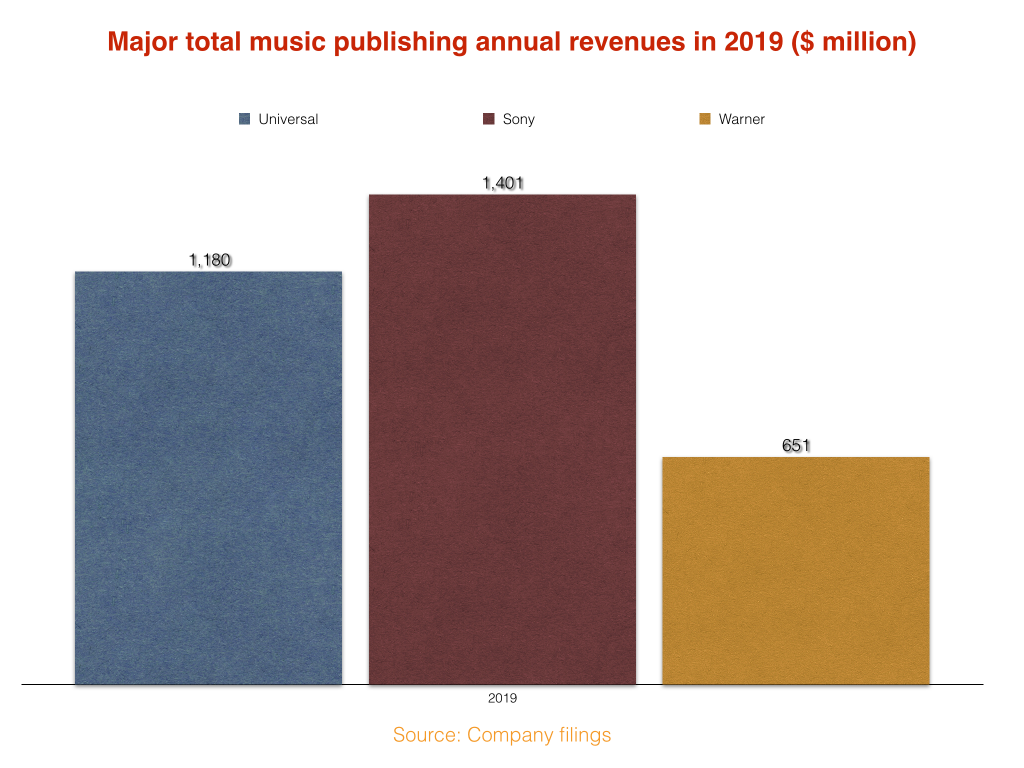The recorded music divisions of the Big Three record labels (Universal Music Group, Sony Music Group, and Warner Music Group) generated more than $1 million every hour from streaming alone in Q4 last year. When Music Business Worldwide announced these calculations last week, it caused a stir in the global music business. The figure — based on corporate, publicly stated investment data by Universal Music Group parent Vivendi, Sony Music Group parent Sony Corp., and Warner Music Group — represents a landmark moment in the recovery of the record industry’s biggest companies.
We can use this same data to discover how much money the recorded music divisions of these companies generated in 2019 across all formats (streaming, physical, and download, plus their ancillary revenue from areas like merchandise and artist ticket sales). This is, perhaps, a more stunning number in terms of its sheer volume: It means that Universal, Sony, and Warner’s labels and artists generated, in total, $14.93 billion last year — up by just under $1.5 billion year-on-year, and equivalent to $41 million per day … or $1.7 million every hour.
There is, however, a significant segment of these three companies’ businesses that is missing from this calculation: their music-publishing activities. Sony Corp. owns the world’s biggest music publisher, Sony/ATV – which also incorporates EMI Music Publishing (EMP), fully acquired in late 2018 – in addition to a separate music-publishing business in Japan. Universal Music Group owns the world’s second biggest music publisher, Universal Music Publishing Group (UMPG), while Warner Music Group (WMG) owns the world’s third biggest, Warner/Chappell.
In recent years, you might have read that some publishers (and their songwriter clients) are less than thrilled with the revenue they receive from streaming services, compared with equivalent royalties pulled in by recorded-music companies. Generally speaking, the owners of the rights to the written song (repped by a publisher) are paid approximately a fifth of the amount of money paid to artists (and the labels repping them) for the performance of the same track on Spotify.
The stats revealed by Rolling Stone below speak volumes about this debate. (Although, it should be remembered that, in many cases, the recorded-music repertoire of a major record company won’t match up with the songwriter repertoire of its sister publishing company; for example, Adele has a global deal with Sony for records, but with Universal for publishing.)
According to my estimates below, again based on corporate data from Vivendi, Sony Corp., and WMG, the three music-publishing companies worldwide generated $3.23 billion among them last year — equivalent to approximately $369,000 per hour. The three major recorded-music companies, remember, shared $1.7 million per hour, an amount nearly five times bigger than the spoils collected by their publishing brethren.

Love Music?
Get your daily dose of everything happening in Australian/New Zealand music and globally.

Who owned the biggest music-publishing operation in the world last year? Sony Corp., which generated $1.4 billion last year in the field, the vast majority of which would have come via Sony/ATV. (A year-on-year comparison of Sony’s publishing numbers here would be unfair: Sony/ATV administered EMP’s catalog in 2018, but the associated revenues were not fully reflected in Sony Corp’s earnings.)
Another billion-dollar-plus publishing company in 2019 was UMPG, which saw its annual revenue grow by $70 million to $1.18 billion, according to my calculations, up from $1.11 billion in 2018. Warner/Chappell’s revenue in 2019 landed at $651 million, down slightly from the $671 million posted in the prior calendar year. (In its most-recent fiscal-year annual report, Warner noted the dip in its FY publishing revenues was “mainly driven by a decrease in revenues associated with lost administrative rights and lower market share.”)
Two further interesting points to raise off the back of the numbers above? First, ex-Warner/Chappell boss Jon Platt became chairman and CEO of Sony/ATV in April 2019, a few months after Sony closed its $2 billion-plus acquisition of EMP. Platt is now the key management figure within a Sony publishing operation that generated more than double the global revenues of his previous employer last year.
And second, when you combine music publishing with the total (all formats) recorded-music numbers from the Big Three, you learn that — across Universal Music Group, Sony Music Group, and Warner Music Group — the major music companies turned over more than $18 billion among them ($14.93 billion for records, plus $3.23 billion for publishing) in 2019.
In other words, when you include both publishing and recorded-music operations, the three majors actually collectively turned over, on average — oh, yes — more than $2 million ($2.07 million) every single hour in 2019.
Tim Ingham is the founder and publisher of Music Business Worldwide, which has serviced the global industry with news, analysis, and jobs since 2015. He writes a weekly column for “Rolling Stone.”



































